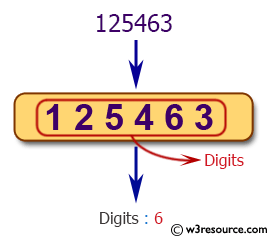Java Conditional Statement Exercises: Reads an positive integer and count the number of digits
Java Conditional Statement: Exercise-29 with Solution
Write a Java program that reads an positive integer and count the number of digits the number (less than ten billion) has.
Test Data
Input an integer number less than ten billion: 125463
Pictorial Presentation:

Sample Solution:
Java Code:
import java.util.Scanner;
public class Exercise29 {
public static void main(String[] args)
{
Scanner in = new Scanner(System.in);
System.out.print("Input an integer number less than ten billion: ");
if (in.hasNextLong())
{
long n = in.nextLong();
if (n < 0)
{
n *= -1;
}
if (n >= 10000000000L)
{
System.out.println("Number is greater or equals 10,000,000,000!");
}
else
{
int digits = 1;
if (n >= 10 && n < 100)
{
digits = 2;
}
else if (n >= 100 && n < 1000)
{
digits = 3;
}
else if (n >= 1000 && n < 10000)
{
digits = 4;
}
else if (n >= 10000 && n < 100000)
{
digits = 5;
}
else if (n >= 100000 && n < 1000000)
{
digits = 6;
}
else if (n >= 1000000 && n < 10000000)
{
digits = 7;
}
else if (n >= 10000000 && n < 100000000)
{
digits = 8;
}
else if (n >= 100000000 && n < 1000000000)
{
digits = 9;
}
else if (n >= 1000000000 && n < 10000000000L)
{
digits = 10;
}
System.out.println("Number of digits in the number: " + digits);
}
}
else
{
System.out.println("The number is not an integer");
}
}
}
Sample Output:
Input an integer number less than ten billion: 125463 Number of digits in the number: 6
Flowchart:

Java Code Editor:
Contribute your code and comments through Disqus.
Previous: Write a Java program that reads a floating-point number. If the number is zero it prints "zero", otherwise, print "positive" or "negative". Add "small" if the absolute value of the number is less than 1, or "large" if it exceeds 1,000,000.
Next: Write a Java program that accepts three numbers and prints "All numbers are equal" if all three numbers are equal, "All numbers are different" if all three numbers are different and "Neither all are equal or different" otherwise.
What is the difficulty level of this exercise?
Test your Programming skills with w3resource's quiz.
Java: Tips of the Day
How to sort an ArrayList?
Collections.sort(testList); Collections.reverse(testList);
That will do what you want. Remember to import Collections though!
Ref: https://bit.ly/32urdSe
- New Content published on w3resource:
- HTML-CSS Practical: Exercises, Practice, Solution
- Java Regular Expression: Exercises, Practice, Solution
- Scala Programming Exercises, Practice, Solution
- Python Itertools exercises
- Python Numpy exercises
- Python GeoPy Package exercises
- Python Pandas exercises
- Python nltk exercises
- Python BeautifulSoup exercises
- Form Template
- Composer - PHP Package Manager
- PHPUnit - PHP Testing
- Laravel - PHP Framework
- Angular - JavaScript Framework
- Vue - JavaScript Framework
- Jest - JavaScript Testing Framework
